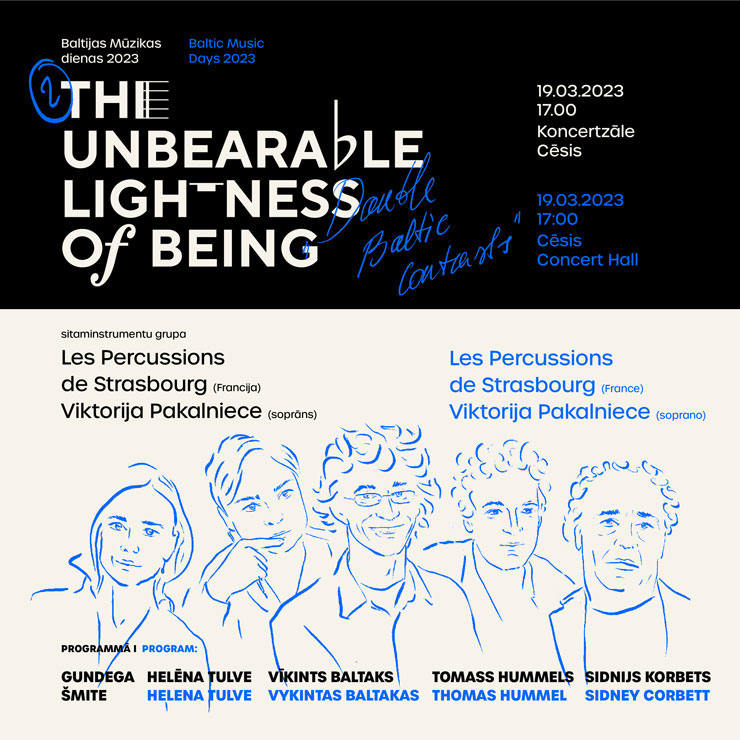“.. as sound artists, the Percussions de Strasbourg have contributed to
invent – the term is well weighed – modern percussion, its writing and
texture.” (Mouvement)
“They have expanded the Western sound beyond its boundaries.” (Hugues Dufourt)
“No
matter how you look at it, the catalog of the Percussions de
Strasbourg, dedicatee of more than 350 works, is quite simply unique”.
(Guillaume Tion, Libération)
A
very special event awaits us at the Cēsis Concert Hall: a performance
by the world's best-known percussion ensemble “Les Percussions des
Strasbourg” together with Latvian soprano Viktorija Pakalniece.
“Les
Percussions des Strasbourg” is a phenomenal, truly unique ensemble,
which was formed by the most important representatives of the 20th
century avant-garde: Pierre Boulez, Olivier Messiaen, Karlheinz
Stockhausen, Edgar Varese, Iannis Xenakis and others. For more than half
a century, the group has stimulated the exploration of sound and the
flourishing of contemporary percussion music. It is no exaggeration to
call them true innovators. "Les Percussions des Strasbourg” have
performed in Berlin, Osaka, Donaueschingen, Athens, New York, Montreal
and elsewhere.
Latvian soprano Viktorija Pakalniece has repeatedly
proven herself as an excellent interpreter of contemporary music with
her high-quality performance and impeccable professionalism.
On the
program, inspired by the German composer Thomas Hummel, we will hear
works by three Baltic composers — Vykintas Baltakas, Helena Tulve and
Gundega Šmite, who will represent the sound worlds of Lithuania, Estonia
and Latvia; alongside the music of American sound artist Sidney Corbett
and Hummel himself.
Helena Tulve has been praised in the
international media as “arguably one of Estonia’s most influential
composers living and working today" (I Care If You Listen), her music
having a “mood [that] is introspective, almost meditational, the
textures and harmonies beautifully imagined". (The Guardian)
Tulve's
piece on this program explores some of the fundamental questions of the
human experience — how do I think? Why is it important to think? Do my
thoughts affect reality? How does one purify the mind? Why is loneliness
so difficult? —considering them through the images of sea and salt.
In
Gundega Šmite’s compositions, “intellectual and intuitive solutions are
realized in a gestural balance. The composer's scores are a canvas of
subtle textures and details." (skani.lv)
In her work “Four Night
Songs”, Šmite draws the listener's attention to the abysses of war,
setting texts by authors who themselves experienced war or the
consequences of authoritarian regimes: Federico García Lorca, Knut
Skujenieks and Euripides.
Vykintas Baltakas is a Lithuanian composer
whose works have been brilliantly performed in the most important
concert venues of Western Europe. Baltakas “has an enormous gift; he
knows exactly what he wants, what he can musically answer for - and he
bows to no convention." (Neue Musikzeitung)
American composer Sidney
Corbett writes music that combines sensual lyricism with rhythmic
complexity. He draws from musical and non-musical sources alike
including literature, art, philosophy and theology; this time turning to
the poetry of Czesław Miłosz.
Thomas Hummel is a German chemist and
composer. Asymmetry, contrasts and the juxtaposition of live sound with
recorded musical instruments comprise only part of his creative
interests. His work on the program takes inspiration from the text of
Russian poet, dissident and pastor Pavel Adelgeim.
This program will be performed twice, in Mannheim and Cēsis.
The concert is supported by the Goethe-Institut and the Cēsis Concert Hall.
“Les Percussions de Strasbourg are subsidised by Ministère de la Culture et de la Communication / DRAC Grand Est, Région Grand Est and Ville de Strasbourg” __________________________________________________________________
About the festival:
Since
2021 “Baltic Music Days” has been organized by the Composer Unions of
Estonia, Latvia, and Lithuania. Each year the festival takes place in a
different Baltic country. The first festival, organized by the Estonian
Composers Union, took place online. The second festival was hosted in
Kaunas, the 2022 European Capital of Culture. This year, 2023, the
festival will take place from March 18-31 in Cēsis and Rīga, Latvia.
Nine concerts are planned for the festival, including the Latvian
National Symphony Orchestra performing at Cēsis Concert Hall, the State
Chamber Orchestra “Sinfonietta Rīga” performing at the Great Guild Hall
in Rīga, and the Latvian Radio Choir performing at the Jāzeps Vītols
Latvian Academy of Music.
A particularly special highlight of the
festival will be a performance by the world-famous percussion ensemble
“Les Percussions de Strasbourg” on March 19, at Cēsis Concert Hall.
The festival as a whole will include 11 world premieres by Latvian composers.
This year, the festival’s overall theme is “The Unbearable Lightness of Being”.
We
have borrowed this theme from the title of Czech/French writer Milan
Kundera’s well-known novel. We came to this idea at the war’s start — a
war, which unfortunately has not yet ended. A war, which has seeped
into our daily lives, into our subconscious; a war, which makes us
shiver in compassion and demands that we help as much as possible.
“…
for there is nothing heavier than compassion. Not even one's own pain
weighs so heavy as the pain one feels with someone, for someone, a pain
intensified by the imagination and prolonged by a hundred echoes”*
Amid
the war and the empathy, life and music continue, offering
opportunities for sensitivity and joy. It is unbearably heavy and light
at the same time. We have asked the festival’s composers to reflect in
their new compositions: is heaviness truly terrible, and lightness
wonderful? Is lightness positive and heaviness negative? For the moment,
it is only clear that the opposition of heaviness and lightness is the
most mysterious and meaningful of all opposites.
Come and listen to it with us!
*Milan Kundera, “The Unbearable Lightness of Being,” 1984.
Tickets: www.bilesuparadize.lv
_________________________________________
The
festival is organized by Latvian Composers Union and supported by the
State Culture Capital Foundation, Baltic Contemporary Music Network,
Geothe-Institut Riga, Latvian Concerts, Riga Latvian Society, Concert
Hall "Cēsis", Latvian Radio 3 "Klasika", Riga Cathedral
